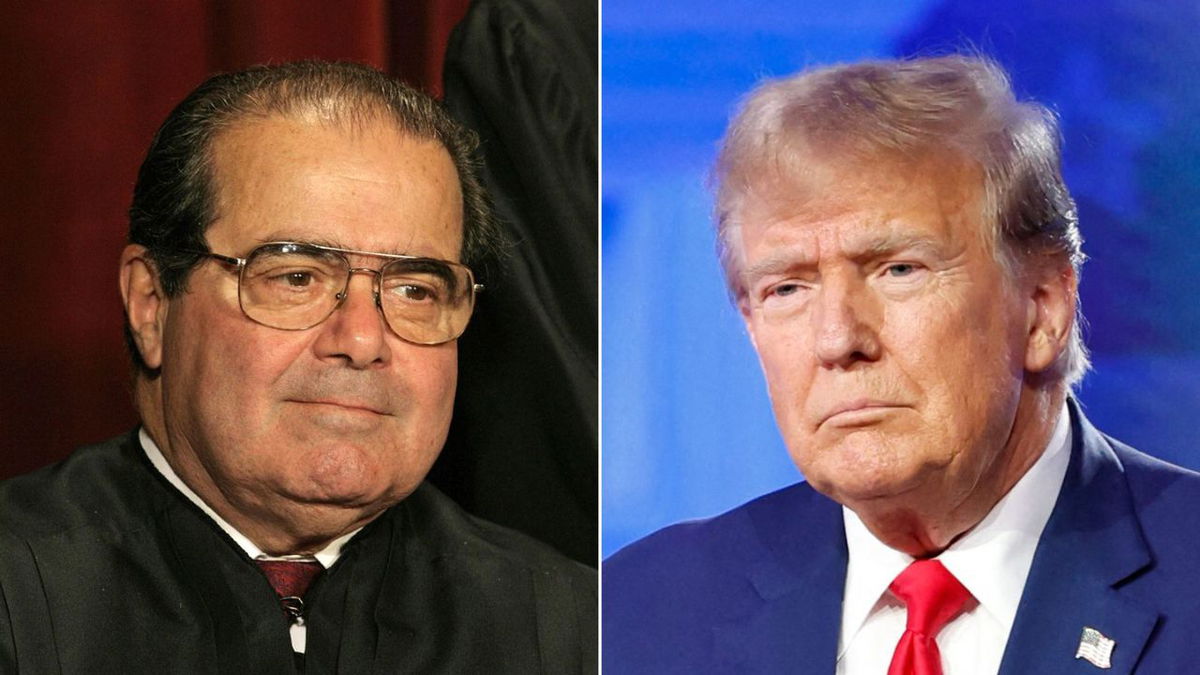Trump’s critics hope that Antonin Scalia can sway the Supreme Court in 14th Amendment fight

By John Fritze, CNN
(CNN) — Liberal groups hoping to keep former President Donald Trump off the ballot for his role in the January 6, 2021, attack on the US Capitol are turning to a surprising source as they make their case to the Supreme Court: the late Justice Antonin Scalia and several of the court’s current conservatives.
The forces opposing Trump are citing a 2014 concurring opinion from Scalia, a hero of the conservative legal movement who died in 2016, as evidence that the 14th Amendment’s “insurrectionist ban” applies to former presidents – not just rank-and-file federal officials.
The blockbuster case will determine whether Trump can run for president again. Oral arguments are scheduled for next Thursday.
On a court where conservatives hold a 6-3 supermajority, including three Trump nominees, citing Scalia is no coincidence. The advocates are hoping to convince the justices that they can write off Trump’s arguments in a way that still squares with conservative legal principles.
“Invoking Scalia is kind of an attempt to cite some moral authority for one of the court’s great originalists,” said Notre Dame Law School Professor Derek Muller, an expert on the case. “They’re not just citing anyone.”
Trump claims presidents are not “officers” of the United States – a term used in the post-Civil War 14th Amendment – and so the ban does not apply to him. Instead, he argues, the term “officers” is meant to capture officials who are appointed by the president, take an oath to uphold the Constitution and then engage in insurrection.
His opponents, including both liberal groups and a number of former Republican officials, balk at that reading in a series of “friend of the court” briefs filed Wednesday.
The “plain text demands” that the amendment applies to former presidents, the Constitutional Accountability Center, a progressive legal advocacy organization, told the justices in a brief that cited Scalia. Historically, the group wrote, “officials in every branch of government referred to the president as an officer of the United States.”
Former conservative appellate judge J. Michael Luttig, who has become an outspoken Trump critic, also cited Scalia in a brief to the court this week.
The Scalia concurrence, joined by Chief Justice John Roberts and two other conservatives, involved a dispute between the teamsters and a soda distributor. The late justice wrote that all “officers” of the United States must be appointed by the president “except where” the Constitution “provides otherwise.”
It is on that caveat that Trump’s critics hang their argument.
The interpretation of Scalia has drawn fierce pushback from other conservatives, notably Joshua Blackman, a professor at the South Texas College of Law Houston, who hopes to take part in arguments next week – in part to explain his read on the Scalia opinion and a short letter the late justice wrote weeks later.
Blackman believes it would be a mistake to view Scalia’s terse language in the concurrence and the letter as a definitive statement of what his position was.
“Part of the problem with this case is people are litigating this issue in blogs and law review articles that are unreviewed,” Blackman said. “Some of these arguments have substantial problems.”
The Scalia concurrence is one instance in which anti-Trump advocates are highlighting past statements from the court’s conservatives to counter the former president’s arguments.
Others have called attention to an opinion Justice Neil Gorsuch wrote in 2012 when he was a judge on the 10th US Circuit Court of Appeals. Gorsuch wrote states were permitted to exclude candidates from the ballot if they were constitutionally ineligible from serving in the office they sought.
Though not mentioned in recent briefs, a case last month indirectly hit on one of the more technical questions in the Colorado ballot dispute: Whether certain constitutional provisions can be enforced on their own (known as “self-executing”) or whether they first require Congress to pass a law. The Colorado Republican Party argues the anti-insurrection clause in the Colorado case requires Congress to step in first.
During the January 16 arguments in a case dealing with whether states may be sued directly when the government takes private property, Justice Samuel Alito, a conservative, posed difficult questions to both sides but at one point appeared to question the notion of a constitutional right requiring a law from Congress.
“That sounds like a very weak right if … it’s subject to limitation in that way,” Alito said.
Whether references to such past statements have an influence on the court is an open question.
“Many times, members of the court greatly respect each other but will disagree with what they’ve had to say,” Muller said. “But for public consumption, it certainly can be persuasive.”
The-CNN-Wire
™ & © 2024 Cable News Network, Inc., a Warner Bros. Discovery Company. All rights reserved.